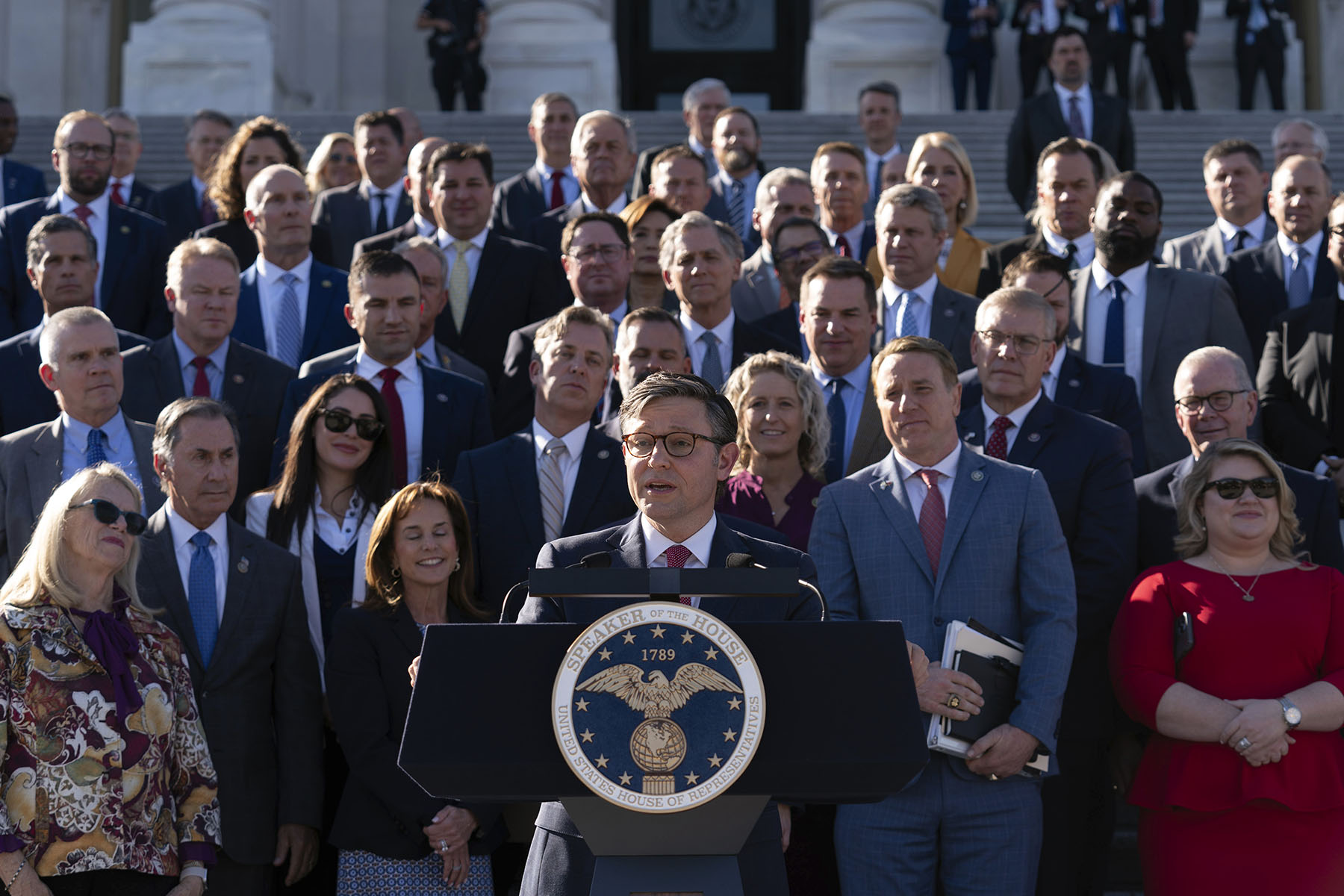Before the newly elected U.S. House Speaker Mike Johnson was in public office, the Louisiana Republican’s restrictive stances on gender identity, abortion and sexuality were honed at the conservative Christian legal group Alliance Defending Freedom, where he served as a senior spokesperson and attorney.
Alliance Defending Freedom, or ADF, is the legal force behind dozens of the most restrictive abortion laws and pieces of anti-LGBTQ+ legislation in the country. It provided the model abortion ban enacted by Mississippi that led to the Supreme Court overturning Roe v. Wade. ADF attorneys are challenging the FDA’s approval of medication abortion. And the organization represented a Colorado designer who successfully argued before the Supreme Court that making wedding websites for same-sex couples violated her personal beliefs.
Johnson, while at ADF, wrote opinion pieces for the newspaper in his hometown of Shreveport that called same-sex marriages “counterfeit legal arrangements” pushed by “radical homosexual advocacy groups” and opposed the inclusion of sexual orientation and gender identity in employment nondiscrimination policies. When the Supreme Court in 2003 struck down anti-sodomy laws as unconstitutional, he wrote that “states have many legitimate grounds to proscribe same-sex deviate sexual intercourse.” (CNN’s K-File has created PDFs of the decades-old articles.) In two cases a decade apart, he defended Louisiana’s same-sex marriage ban before the state’s highest court.
Johnson’s path to the speakership was circuitous, but it puts an ally of one of the country’s most influential anti-LGBTQ+ and anti-abortion groups third in line for the presidency. Twenty-two days after the former speaker, Rep. Kevin McCarthy of California, lost support from the right wing of his party — and his fellow Republicans rejected as replacements Reps. Steve Scalise of Louisiana and Jim Jordan of Ohio, among others — Johnson was elected in a 220-to-209 vote, with all Republicans in favor, all Democrats supporting Minority Leader Hakeem Jeffries of New York, and four lawmakers not voting. It was a stunning ascension, indicating the extent to which former President Donald Trump and aligned MAGA forces still wield influence over the GOP House nearly three years after he lost the 2020 election.
Johnson, after serving on Trump’s legal team during his first impeachment, was the “most important architect of the Electoral College objections” that led to the January 6 insurrection at the U.S. Capitol, the New York Times reported. He also led a friend-of-the-court brief in a case brought by the state of Texas that unsuccessfully sought to have the Supreme Court reject electoral votes from Arizona, Michigan, Pennsylvania and Wisconsin.
“I would be hard-pressed to think of a worse member to be elected speaker of the House,” said Allen Morris, policy director for the National LGBTQ Task Force. “Americans should consider his track record on the preservation of and maintenance of our very democracy as one that should concern us all.”
Now, as speaker, Johnson will have concrete duties like setting the House floor schedule as well as an informal but influential role shaping the Republican Party’s policy priorities as all 435 House seats are up for reelection next year, along with about a third of the Senate and the White House. Abortion was a liability for Republican candidates in the 2022 midterms, as disapproval of the Supreme Court’s June 2022 ruling in Dobbs vs. Jackson Women’s Health Organization helped dampen Democratic losses, given historically poor midterms performances by the party that holds the presidency.
Johnson, the former head of the conservative Republican Study Committee, argued before Dobbs that abortion access was a states rights issue — but he has also supported federal legislation setting gestational limits, cosponsoring a bill to establish a 20-week ban. In a 2021 hearing on an abortion ban in Texas, Johnson testified that “when a woman is pregnant, science tells us that the new life she carries is a completely separate and full new human being from the moment of fertilization.” When life begins is a question often left to religion, not science. As anti-abortion hardliners pursue personhood rights for fetuses, establishing life from the moment of fertilization to undergird policy could have profound implications not just for bodily autonomy and the ability to access abortions, but also contraception and fertility procedures. Johnson also opposed the Right to Contraception Act that the House approved last year, before Republicans regained control.

He is longtime friends with conservative anti-abortion Supreme Court Justice Amy Coney Barrett, whose 2020 nomination and confirmation to the high court he supported with fervor. The anti-abortion group Susan B. Anthony Pro-Life America has given Johnson an A+ on its scorecard of those who oppose reproductive rights.
Rep. Nancy Mace, a Republican from South Carolina who supports some level of abortion access and is seen as a more moderate voice from her conference despite voting to oust McCarthy, told the Wall Street Journal that Johnson’s election was a “best case scenario.” Trump said in a short news conference that Johnson will “be a great speaker of the House, and we were very happy to have helped,” adding: “I think you’re going to be very proud of him.”
The group Americans for Contraception said in a statement after Johnson’s election that his record “leaves no room for debate: this is an individual who supports limiting access to essential healthcare services and infringing on Americans’ personal freedoms.”
A spokesperson for President Joe Biden and Vice President Kamala Harris’s reelection campaign, Ammar Moussa, called Johnson a “loyal foot soldier to ban abortion nationwide,” and said his election “cements the extreme MAGA takeover of the House Republican Conference.” In Biden’s official capacity, he called Johnson to offer congratulations, and said via a statement that “even though we have real disagreements about important issues, there should be mutual effort to find common ground wherever we can.”
Johnson is a Southern Baptist who has long held conservative views about gender roles and identity. He started developing a national profile back in the 1990s, when he and his wife, Kelly Johnson, did interviews discussing their covenant marriage, a type of union that limits when parties can seek divorce. Louisiana is one of just three states to offer this type of marriage, which requires premarital counseling and testifying that marriage is for life.
When Johnson first ran for his House seat in northwest Louisiana in 2016, he told a Baptist website that he felt “called to legal ministry,” saying: “I’ve been out on the front lines of the ‘culture war’ defending religious freedom, the sanctity of human life, and biblical values, including the defense of traditional marriage, and other ideals like these when they’ve been under attack.” He pointed out that he pursued legislation that reflected these values when he was in the Louisiana state House from 2015 to 2017 and also as an ADF attorney.
Johnson continued once in the House, despite keeping a relatively under-the-radar profile. As vice chair of the House Republican Conference, he made clear that he opposes gender-affirming care for minors. He introduced a bill that would restrict the discussion and programming related to gender identity, sexual orientation and gender dysphoria with children at federally funded institutions — a federal “Don’t Say Gay” bill, according to its critics.
With a temporary government funding measure set to expire, Johnson assumes the gavel with just several weeks to pass a series of federal appropriations bills and avert a government shutdown. On X, formerly Twitter, Johnson pledged as speaker to “advance a comprehensive conservative policy agenda, combat the harmful policies of the Biden Administration, and support our allies abroad. And we will work to restore sanity to a government desperately in need of it.”
Shefali Luthra and Orion Rummler contributed reporting.







